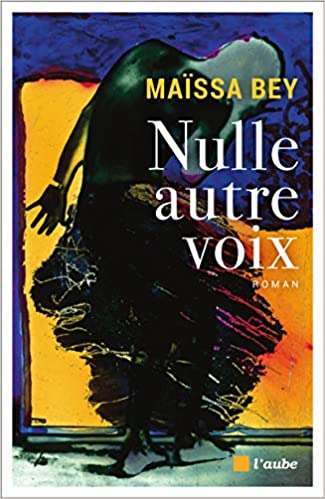)
Nulle autre voix
(Éditions de l’aube, 2018)
de Maïssa Bey
Dire que dans Nulle autre voix Maïssa Bey dénonce la violence faite aux femmes ne serait pas faux. Ce serait seulement un peu trompeur, et fâcheusement réducteur. Car Nulle autre voix, c’est surtout un roman subtil et sans concession sur le pouvoir libérateur de l’écriture.
Ça commence, comme dans une pièce de théâtre classique, par trois coups : l’histoire se déroule dans l’Algérie actuelle ; une femme tue son mari violent. Après quinze années de prison, elle retourne dans son appartement où elle vit désormais seule et ne sort que pour faire ses courses – tôt le matin pour éviter de voir du monde : un confinement qu’elle “choisit” pour se protéger contre la malveillance des gens qui la jugent. Mais voila qu’une femme « qui se dit écrivaine » frappe à sa porte : elle veut écrire un « roman non-fictionnel » inspiré de l’histoire vraie de cette ex-détenue – qui accepte la proposition de se confier. Une décision déclencheuse de chaque page du livre Nulle autre voix, puisque, la narratrice (la vraie écrivaine, pourrait-on dire) se met, alors, à écrire, elle, à se raconter, chaque soir, dans ses carnets.
.
It would not be untrue to say that in Nulle autre voix (No Other Voice) Maïssa Bey denounces violence against women. It would just be a little misleading – and sadly reductive. Because Nulle autre voix, is above all a subtle, uncompromising novel about the liberating power of writing.
It begins, like a classic French play, with ‘les trois coups’ (three blows): the story is set in contemporary Algeria; a woman kills her violent husband. After fifteen years in prison, she has gone back to her flat where she now lives alone, going out only to do her shopping – first thing in the morning, to avoid seeing people : a self-isolation that she has ‘chosen’ in order to protect herself against the malice of people who judge her. But one day a woman ‘who calls herself a writer’ knocks at her door: she wants to write a ‘non-fictional novel’ based on the true story of this ex-convict – who agrees to tell her story. A decision that triggers every page of Nulle autre voix, since the narrator (the real writer, one might say) starts to write, to tell her own story, every night, in her exercise book.
Books by Maïssa Bey available in English:
Do You Hear in the Mountains… and Other Stories (University of Virginia Press, 2018) Maïssa Bey. Translated by Erin Lamm. Afterword by Alison Rice
Above All, Don’t Look Back (University of Virginia Press, 2018) Maïssa Bey. Translated by Senja L. Djelouah; introduction by Mildred P. Mortimer
Abonnez-vous pour être averti des nouveaux articles publiés: voir NEWSLETTER – Farlane on French Writers
.
Sign up to e-newsletter to be alerted when new reviews are posted